|
Bradley T. Van Deusen, father
|
|
Selected Poetry from Newspaper Column and Old Soldiers' Drums
Old Soldiers' Drums
1928-9 University of Chicago Daily Maroon Poetry Column
Outcasts
Daily Maroon - Nov 7, 1928
Outcast men of the world are we,
Sunk in the depths of iniquity
Detested by all and loved by none.
A blot on the face of the kindly sun.
Men of training and breeding and birth
Who knew full well what the game was worth
Who played their hands -- and lost --
 -- and then -- and then
Lost themselves from the world of men.
We hid ourselves in the Island world
Where the flashing coils of the "Snake" are curled
We sought the depths to hide our shame.
The "thing" we had made of an honored name.
We swam the Bay in the early dawn
But the Shark came not, and we lived on.
We sought the end in the bolo's steel
But hearts wounds live, while flesh wounds heal.
We went unarmed to the Moro's "jil"
But they called us "mad" and they would not kill.
And the Padre came with his tale of Grace
But we knew better, and laughed in his face.
We twined our hearts in a woman's hair
Then tried to forget in the din and glare
Of a "tienda down on the opal bay
Where many men come and some men stay.
We lost ourselves in the Army then,
Our identity merely "Enlisted Men"
But in the dusk, when the shadows start to crawl
In their weird, wild dance on the barracks wall
A ghastly pageant that comes to stir
Our memory again to what we were
And we bow our heads and stifle a cry
For we don't know how and we'll never know why.
 El Tigre. El Tigre.
The Blind Alley
by Louis H. Engel
University of Chicago Daily Maroon - Jan 18, 1929
...
Only the good Lord knows where he came from or where he's likely to go. (The
one question is as problematical as the other.) I don't know but what the Lord
Himself may have lost track of this boy at some stage of the game, for from the
stories he tells he's batted around all over Hell and gone. ...
The Tiger is something more than an adventurer. He's an aesthete -- if you
can imagine such a thing as an aesthetic ex-prize fighter. He claims intimacy
with some of the
literary lights of our American Bohemia and has written
poetry himself. He's got a knapsack full of verse and pictures (You really ought
to see some of his photos. They've been snapped in every quarter of the globe
and they include pictures of everything from the Hula queen to hizzoner
himself in football togs.) ...
|
|
Jean A. Butridge, mother
|
|
| |
From "Chicago Sketches"
1. EVENING
Chicago rising greyly in the wet mist. Moment at dusk when buildings
are silver sword thrusts of slim shadow. Lights flashing like crystal
beads on the dark suede walls of the Carbon and Carbide Building. The
rain stops suddenly ... a gold-rose sifts through the grey haze melting
gradually into the sharper outlines of night, quick night in Chicago.
The Lake boils up threateningly, then slips quietly back thru the
reflections of the Navy Pier lights. The city is cut by a white-beamed
revolution of the Lindberg Beacon, imperially slanting the sky.
Michigan Avenue is a steep precipice spotted with brilliance,
overhanging the sparkling plain of Lake Michigan. Randolph Street
blares into State and the swarming theatre crowds ... smart women in
Chincilla wraps...eager expectancy of newsboy faces, hoarsely
proclaiming significiant incoherencies
|
|
Catherine Burnett Van Deusen, grandmother
|
|
| |
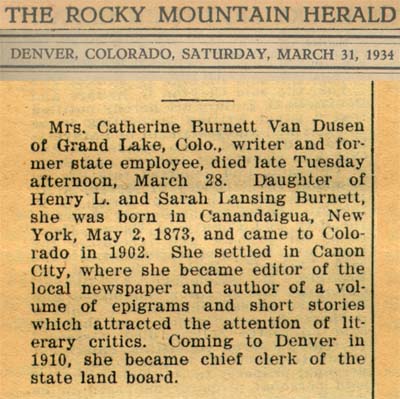
From "Hot Shots"
Once upon a time there was a man with an Ambition.
It was a very serious one and his friends urged him to have it removed by a surgical operation, but he was proud and very Hopeful.
At first the people were afraid of him and his big ambition, but by and by they found he was like a balloon, a very great amount of gas
and a very little man attached to it, and they were not afraid any more.
But the man soared high in the wind and believed he was an Eagle.
Moral - the prick of a pin can cause disaster.
|
|
Jack Bell, grandfather
|
|
| |
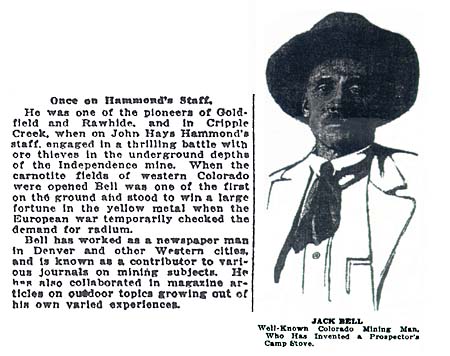
From "God's Acre in the Desert"
The cemetery was given by a prospector, a part of his claim. It lies in a desert wash where the waters from cloudbursts rage down in
sweeps of sand and sagebrush debris. The board head-markers, storm-sand blasted, names unrecognizable.
Here the faint marks of a child's grave! Loving hands that have gone far away outlined the little spot with heavier rock that one can see.
Now where the wooden marker has been turned to the east the dim-painted name can with difficulty be deciphered. God! What desolation!
Not a blade of grass, the very nearest tree 40 miles away, and the closest water 25 miles in the soap-bubble distance on the vast area of alkali flats.
Barren hills, no living thing, not even a lizard, the graves forgotten. No loving hands to keep them green; no visitor,
with the single exception of the stray coyota, and even he, the desert sneak, swerves and does not cross the sacred ground.
|
|
Henry L. Burnett, great grandfather
|
|
Memories of the Lincoln Assassination Trial
MOOD OF THE TIME
The gloom of that journey to Washington and the feeling of vague terror and sorrow with which I
traversed its streets, I cannot adequately describe, and shall never forget. To this day, I
never visit that City without some shadow of that dark time settling over my spirit. All the public
buildings and a large portion of the private houses were heavily draped in black. The people moved
about the streets with bowed heads and sorrow-stricken faces, as though some Herod had robbed each home of
its first born.
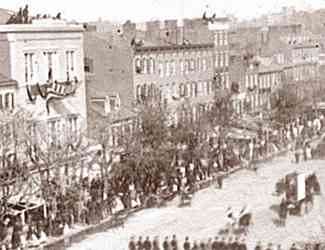
When men spoke to each other in the streets, there were tremulous tones in their voices, and a quivering
of the lips, as though tears and violent expression of grief were held back only by great effort. In
the faces of those in authority -- Cabinet ministers, officers of the army, -- there was an anxious
expression of the eye as though a dagger's gleam in a strange hand was to be expected; and a pale
determined expression, a set of the jaw that said: "The truth about this conspiracy shall be made clear
and the assassins found and punished: we will stand guard and the Government shall not die."
|
|
Henry L. Lansing, 2nd great grandfather
|
|
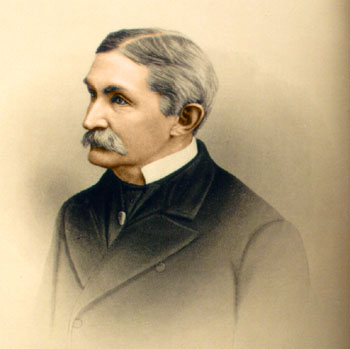
HISTORY OF ONTARIO COUNTY, p.493
In one particular, in which business men are too generally negligent, Mr. Lansing excelled;
he had cultivated the art of letter writing until his epistolary style became of rare excellence.
He could express himself in the readiest and neatest way with great apparent ease, his letters
were bubbling over in sentiment, expressed with great felicity and beauty, as all who ever
received them will bear testimony.
Mr. Lansing was a most delightful companion and enjoyed good company, but it had to be the best in order to
afford him any pleasure. He was extremely fond of poetry and had no end of quotations upon his tongue's
end, and possessed the unusual faculty of being able to repeat from memory whole pieces, no matter how long
they were, provided they awakened a responsive chord.
|
|
Henry Livingston, 5th great grandfather
|
|
Night Before Christmas Author
1819 New Year's Carrier's Address
Poughkeepsie Journal
Believe me, dear patrons, I have wand'red too far,
Without any compass, or planet or star;
My dear native village I scarcely can see
So I'll hie to my hive like the tempest-tost bee.
Hail home! sacred home! to my soul ever dear;
Abroad may be wonders but rapture is here.
My future ambition will never soar higher
Than the clean brushed hearth and convivial fire;
Here I lounge at my pleasure, and bask at my ease,
Full readily sooth'd, and desirous to please,
As happy myself as I happy can be,
I wish all the circle as happy as me.
But hark what a clatter! the Jolly bells ringing,
The lads and the lasses so jovially singing,
Tis New-Years they shout and then haul me along
In the midst of their merry-make Juvenile throng;
But I burst from their grasp: unforgetful of duty
To first pay obeisence to wisdom and Beauty,
My conscience and int'rest unite to command it,
And you, my kind PATRONS, deserve & demand it.
On your patience to trespass no longer I dare,
So bowing, I wish you a Happy New Year.
|
|
Colonel Henry Bicker, 5th great grandfather
|
|
2nd Pennsylvania Orderly Book, Valley Forge
Head Quarters Valley Forge, April 17th, 1778.
The Colonel is sorry to find that so little attention has been given to the General Order for cutting the
men's hair. Now desires that the commanding officers of companies in Camp will see the order
punctually complied with tomorrow. No longer delay will be dispensed with.
|
|
Edward Antill, 6th great grandfather
|
|
From The Grape and New Jersey
"Perhaps Antill's greatest accomplishment and surely his most important contribution to
American viticulture was his 'treatise' on the subject.
Entitled 'An Essay on the cultivation
of the Vine, and the making and preserving of Wine, suited to the different Climates in
North-America', it was published posthumously in 1771 in the first volume of the
Transactions of the American Philosophical Society. In forwarding the piece for
publication in May, 1769, Antill wrote 'I have at last, after many hard struggles, and
many a painful hour, labouring under a tedious disorder, finished the essay on the
cultivation fo the Vine ...'. He had recently removed from his estate at Raritan Landing to
Shrewbury, New Jersey, where he died on 15th August, 1770. The first publication by an
American on any fruit, Antill's eighty-page essay remained the authorative work on the
subject for more than fifty years. It borrowed heavily from Columella's classical Of
Husbandry in Twelve Books, from Philip Miller's The Gardener's Dictionary, and from other
contemporary authorities, but incorporated as well the results of Antill's own
experiments."
|
|
Reverend Noah Wells, 6th great grandfather
|
|
Bibliography:
Introductory Poem, to New Jersey
Governor William Livingston's "Philosophic Solitude, or, the Choice of a
Rural Life."
A discourse delivered at Fairfield, at the funeral of the
Rev. Noah Hobart M.A. late Pastor of the First Church
of Christ there; who departed this life December 6th,
1773. In the 68th year of his age and 41st of his
ministry.
Patriotism described and recommended, in a sermon
preached before the General Assembly of the colony of
Connecticut, at Hartford, on the day of the anniversary
election, May 10th, 1764.
Animadversions, critical and candid, on some parts of
Mr. Beach's late "Friendly expostulation," in a letter,
from a gentleman in New-England, to his friend in
Pennsylvania.
The Divine right of Presbyterian ordination asserted,
and the ministerial authority, claimed and exercised in
the established churches of New-England, vindicated
and proved: in a discourse delivered at Stanford [i.e.,
Stamford], Lord's-Day, April 10, 1763.
The real advantages which ministers and people may
enjoy especially in the colonies, by conforming to the
Church of England; faithfully considered, and
impartially represented, in a letter to a young
gentleman.
A vindication of the validity and divine right of
Presbyterian ordination, as set forth in Dr. Chauncy's
sermon at the Dudleian lecture, and Mr. Welle's [sic]
discourse upon the same subject, in answer to the
exceptions of Mr. Jeremiah Leaming, contained in his
late Defence of the Episcopal government of the church.
|
|
Sidney Breese, 6th great grandfather
|
|
Breese Family
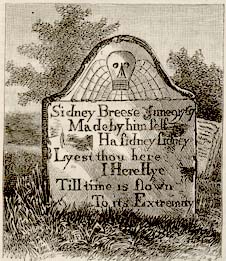
Sidney Breese
June 9, 1767,
Made by himself.
Ha! Sidney, Sidney,
Lyest thou here?
I here lye
Till time is flown
To its extremity-
|
|
Governor Lewis Morris, 7th great grandfather
|
|
In Defense of the Address to Lord Lovelace
As Ravens and Night-owls their Voices betray
So Asses are certainly known when they bray.
And Spight of the Noise and bustle they've made
Mankind will believe that a Spade is a Spade.
That Bullies and Bankrupts, and Men without Store
Dull wretches that have not one Virtue or More,
The Pests of the Country, whose Practice has been
To flatter the Governor, and Lie to the Queen,
Have right to no favour in a Well-govern'd State
But to Swing in an Halter, or peep through a Grate.
In 1714, future New Jersey Governor Morris collaborated with Governor Robert Hunter on
production of the first play printed in America.
|
|
Captain Martin Cregier, 8th great grandfather
|
|
Massacre at the Esopus
1663 Journal of the military expedition led by Captain Martin Cregier, which went after the Indians
who had raided the Wildwyck settlement (now Kingston NY) and taken prisoners.
On the 4th July we entered the Esopus Kill in front of the redoubt with the two Yachts, and
sent the Sergeant Pieter Ebel with 40 men up to the village Wildwyck to fetch wagons; he
returned to the river side about 2 o'clock in the afternoon accompanied by Serjeant Christiaen
Nyssen, 60 men and 9 wagons; they loaded these and departed with them to the Village
where I arrived towards evening. Saw nothing in the world except three Indians on a high
hill near the redoubt.
5th ditto. Returned to the water side with 60 men, 10 horsemen, and 9 wagons to bring up
supplies, but saw scarcely anything on the way.
6th ditto. Made another journey to the shore with 10 wagons and brought up the remainder
of the supplies, but did not perceive anything. In the evening went for grass with 12 wagons
30 Soldiers and 10 horsemen; then saw 10 or 12 Indians calling to each other but nothing
further transpired.
|
|
Margarita Van Schlichtenhorst, 9th great grandmother
|
|
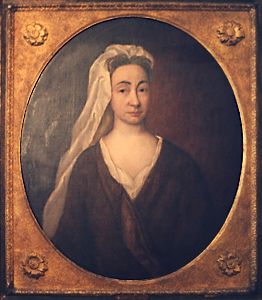 Henry Livingston's Ancestors
Henry Livingston's Ancestors
I'm young Margarita van Slichtenhorst,
My father's the Master, we call him Baas,
Of de Heer van Renssalaer's Bouwerie,
This brought us here from the Zuider Zee.
My mother is dead, and I'm all alone
To care for my father's simple home,
But I try to do it as well as may be,
Though I long for my home by the Zuider Zee.
My father's a man who knows so much,
Though you'd not understand his Holland Dutch.
He is not handsome, and yet, you know,
He's brave and kind, and I love him so.
|
|
Reverend John Livingstone, 9th great grandfather
|
|
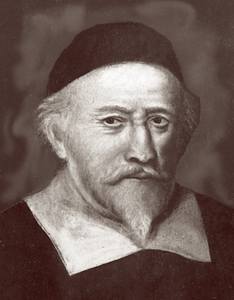
Autobiography
...
Having at home learned to read and write, I was sent, in the year 1613, to Stirling, to a
Latin school, where Mr William Wallace, a good man, and a learned humanist, was
schoolmaster; where I stayed till summer 1617; at which time I was sent for, to be
present with my mother dying. About October 1617, I was sent to the College of
Glasgow, where I stayed four years. I passed master of arts July 1621. After that I
stayed in my father's, in Lanark, till I began to preach. ...
|
|
Peter Folger, 9th great grandfather
|
|
A Looking-Glass for the Times, published in 1676, shows that
Peter Folger was not only well informed in theology, but in political affairs, such as they then were in New
England.
I Am for Peace
Autobiography of Benjamin Franklin
My mother, the second wife, was Abiah Folger, daughter of Peter Folger, one of the first settlers of New
England, of whom honorable mention is made by Cotton Mather in his church history of that country, entitled Magnalia Christi Americana, as 'a godly, learned Englishman," if I remember the words rightly. I have heard that he wrote sundry small occasional pieces, but only one of them was printed, which I saw now many years since. It was written in 1675, in the home-spun verse of that time and people, and addressed to those then concerned in the government there. It was in favor of liberty of conscience, and in behalf of the Baptists, Quakers, and other sectaries that had been under persecution, ascribing the Indian wars, and other distresses that had befallen the country, to that persecution, as so many judgments of God to punish so heinous an offense, and exhorting a repeal of those uncharitable laws. The whole appeared to me as written with a good deal of decent plainness and manly freedom. The six concluding lines I remember, though I have forgotten the two first of the stanza; but the purport of them was, that his censures proceeded from good-will, and, therefore, he would be known to be the author.
"Because to be a libeller (says he)
I hate it with my heart;
From Sherburne town, where now I dwell
My name I do put here;
Without offense your real friend,
It is Peter Folger."
*************************
A DENUNCIATION OF WAR
If that the peace of God did rule,
with power in our heart,
Then outward war would flee away,
and rest would be our part.
If we do love our brethren,
and do to them, I say,
As we would they should do to us,
we should be quiet straightaway.
But if that we a smiting go,
of fellow-servants so,
No marvel if our wars increase
and things so heavy go.
'Tis like that some may think and say
our war would not remain,
If so be that a thousand more
of natives were but slain.
Alas! these are but foolish thoughts,
God can make more arise,
And if that there were none at all,
he can make war with flies.
It is the presence of the Lord,
must make our foes to shake,
Or else it's like he will ere long
know how to make us quake.
Let us lie low before the Lord
in all humility,
And then we shall with Asa see
our enemies to fly.
But if that we do leave the Lord,
and trust in fleshly arm,
Then 'tis no wonder if that we
do hear more news of harm.
Let's have our faith and hope in God,
and trust in him alone,
And then no doubt this storm of war
it quickly will be gone.
Thus, reader, I, in love to all,
leave these few lines with thee,
Hoping that in the substance we
shall very well agree.
If that you do mistake the verse
for its uncomely dress,
I tell thee true, I never thought
that it would pass the press.
If any at the matter kick,
it's like he's galled at heart,
And that's the reason why he kicks,
because he finds it smart.
I am for peace, and not for war,
and that's the reason why
I write more plain than some men do,
that use to daub and lie.
But I shall cease and set my name
to what I here insert,
Because to be a libeller,
I hate it with my heart.
From Sherbon town, where now I dwell,
my name I do put here,
Without offence your real friend,
it is PETER FOLGER.
[William P. Trent and Benjamin W. Wells, "Colonial Literature,"
New York, Thomas Y. Crowell & Co., 1901.]
|
|
Reverend William Baudertius, 11th great grandfather
|
|
From The Beekmans of New York, 1647-1877 by Philip L. White
Baudartius, as his participation in the Synod of Dort suggests, enjoyed
considerable stature as an intellectual leader. At the Synod he had
participated not only in the formulation of the doctrines of the Dutch
Reformed Church, but also in prescribing its forms of worship.
Furthermore, he was one of the handful of scholars selected to make
the authorized translation of the Bible into Dutch.
In 1632 when the Old Testament translation was completed after
many years of effort, it was immediately acclaimed on all sides and
has been employed ever since. In addition to this scholarly activity
William Baudartius also published some poems and a highly partisan
chronicle of Dutch history from 1603 to 1624, one of the earliest
scholarly works to be published in Dutch. He also left an autobiography
which remains unpublished.
BAUDARTIUS, Willem. Viva Delineatio, ac Descriptio Omnium Proeliorum ... quŠ,
durante Bello adversus Hispaniarum Regem in Belgii Provinciis ... gestŠ sunt.
[Half-title:] Polemographia Auraico-Belgica. [Part 2:] Polemographiae Nassovicae
Pars Secunda.
Amsterdam, Michiel Colijn, 1622 (part 1), 1621 (part 2).
An extensively illustrated account of the first part of the Eighty
Years' War, from its beginning in 1568 to the Twelve-Year Truce of 1609-1621, and in fact
covering events from 1559 to 1615. The 285 numbered engravings show a map of the
seventeen provinces (the modern Netherlands and Belgium) and numerous detail maps,
portraits, city and fortress maps, bird's-eye views, battle scenes on land and at sea, sieges,
siege equipment, gruesome scenes of the slaughter of women, children and other civilians in
the cities, and other historical scenes. The double-page panorama shows a bird's-eye view
of the Rhine and Maas valleys from Arnhem to Cologne and beyond, stretching as far as
Ravensberg and Hessen to the left and Maastricht and Tongeren to the right.
Willem Baudartius (1565-1640) studied theology but was more of a scholar and propagandist
than a preacher. The present work was originally published in Dutch during the Twelve-Year
Truce and was no doubt intended to gear up the Dutch for the renewal of the war in 1621
and to fuel Dutch hatred of the Spanish.
|
|










